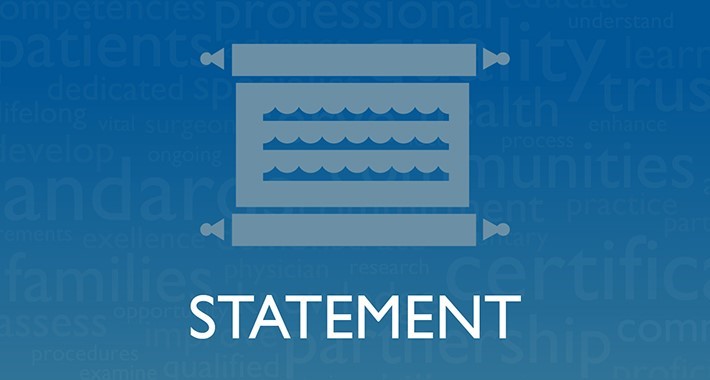
We, the ABMS Member Boards, are committed to delivering continuing certification programs that are meaningful to your members, the public, and all stakeholders that depend upon the certificate for assurance that physicians possess the knowledge and clinical judgment to practice safely in their specialty. For the certificate to have enduring meaning across the working life of physicians there must be a process to ascertain whether certified physicians continue to demonstrate the knowledge and skills and commitment to the high-quality care required by the specialty.
Like you, we believe that physicians are dedicated to lifelong learning and to providing the best possible care to their patients. Like you, we are committed to advancing the highest possible standards for medical specialty practice.
The ABMS Member Boards understand that programs for Maintenance of Certification (MOC) should deliver more value to participating physicians than they currently do. You have reported concerns from your members about complexity, convenience, relevance to practice, and the indirect cost of participating in the programs. You have also encouraged us to identify and implement best practices across the specialties, which will send a consistent signal about what it means to be certified by an ABMS Member Board.
We are committed to working closely with you to improve the experience of participating in continuing certification and to ensuring that every participating physician will find value in the process and satisfaction in the profession. We commit to doing so in a way that strengthens the trust that patients, physicians, hospitals, and other health care organizations place in certification today.
What we are doing about it
All the Boards are implementing changes to make their programs more convenient, supportive, relevant, and cost-effective. Each has taken its own approach, based on its study of the validity and psychometric rigor of the assessment options, as well as preferences expressed by their diplomates.
- To make testing more relevant to practice, Boards have modularized the exam in specific practice areas and given their diplomates more flexibility over the scope and frequency of assessment;
- To eliminate the indirect costs of participation, Boards have modernized the assessment through convenient on-line testing or remote proctoring, eliminating the need for preparation courses, travel to exam centers, and time away from practices;
- To simulate real-life application of knowledge and decision making, some Boards now permit the use of reference materials during the exam;
- To assure that knowledge assessments help participating physicians to identify gaps in knowledge and guide their learning, assessments are accompanied by timely, actionable feedback;
- To increase alignment between MOC and other quality and safety programs, a much wider variety of practice-based learning and improvement activities are now recognized, including those offered through hospitals, specialty societies, and state medical societies.
- To assure opportunities for remediation of knowledge gaps, all Boards provide multiple opportunities for physicians to retake the exam.
Meanwhile, the entire Boards Community has:
- Initiated a major redesign of ABMS governance to increase Board accountability and provide an ongoing opportunity for participating physicians to directly impact ABMS programs and policy;
- Initiated the development of organizational standards to increase operational consistency, transparency, and effectiveness across the Boards; and
- Launched the Continuing Board Certification – Vision for the Future initiative to gather broad input about continuing certification from a wide range of stakeholders (especially physicians who spend most of their time in practice), consider alternatives, and make recommendations for the future.
Our commitments to you
In addition to pursuing the changes mentioned above, the ABMS Boards commit to the following.
By the end of the second quarter of 2018, the small number of ABMS Boards that have not already started implementing pilots as alternatives to the secure high-stakes exam will have begun exploring or piloting alternative approaches for assessment of knowledge and clinical judgment. In current pilots, the Boards have learned that some physicians prefer the high-stakes examination, so many Boards will continue to offer the examination as an option.
By the end of the third quarter of 2018, ABMS will:
- Adopt a new governance structure that creates mechanisms to increase physician input;
- Develop a mechanism to report initial certification along with continuing certification on the ABMS public website like what is reported on the professional profile and on many Member Board websites; and
- Field a national physician survey and provide an open opportunity for physicians and all other stakeholders to provide direct input to ABMS about the MOC experience and advice for the future of continuing certification.
The Boards have made significant changes to their continuing certification programs to address the concerns you have raised and have received positive feedback from many physicians. We are committed to working with you to deliver a practical and meaningful program that engages participating physicians in a positive way and helps them improve care.
Download PDF of this statement.
-
Read More:
- Continuing Certification |
- Statements |
